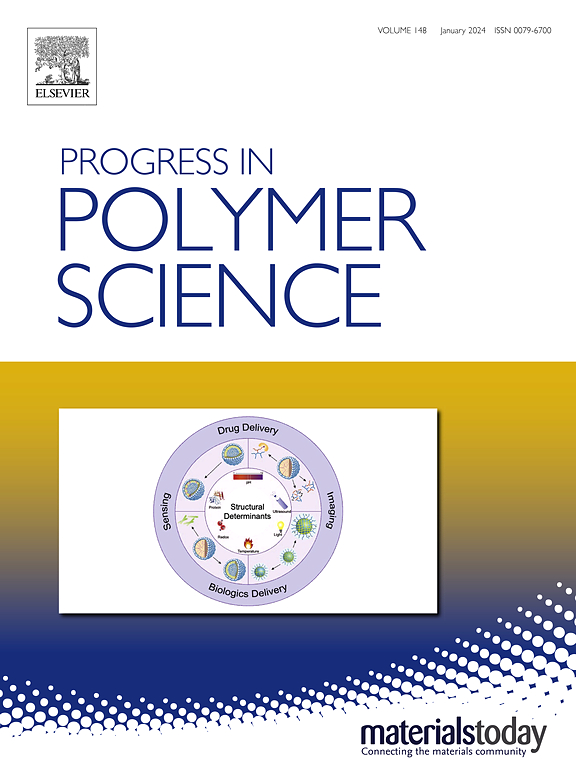用于生物电子学的离子聚合物
IF 26.1
1区 化学
Q1 POLYMER SCIENCE
引用次数: 0
摘要
在过去的几十年里,离子聚合物作为固体聚合物电解质、粘合剂和离子聚合物在电池、电解槽和燃料电池等设备中被用作能源应用的关键材料。最近,离子聚合物也成为生物电子学中用于新生物医学技术的使能材料。本文综述了近年来用于生物电子器件的离子聚合物的设计、合成和表征方面的研究进展。综述了目前正在发展的离子聚合物家族,如聚(离子液体)和聚(共晶溶剂),以及离子凝胶家族,如水凝胶、离子凝胶和共凝胶。将讨论从纯离子导体到混合离子电子导电聚合物的聚合物和凝胶。我们深入研究了结构-离子电导率关系,并概述了这种新型导电材料的当前和可能的应用。这些离子聚合物是基础生物电子器件发展的核心,如有机电化学晶体管、安培检测器、控制释放装置,甚至是破坏性神经形态计算。本文章由计算机程序翻译,如有差异,请以英文原文为准。


Ionic polymers for bioelectronics
In the last decades, ionic polymers have been used as key materials for energy applications as solid polymer electrolytes, binders and ionomers in devices such as batteries, electrolyzers and fuel cells. More recently, ionic polymers are becoming enabling materials also in bioelectronics for new biomedical technologies. This review aims to collect and discuss the recent advances in polymer design, synthesis and characterization of ionic polymers for bioelectronic devices. The review includes the ionic polymer families that are being developed, such as poly(ionic liquid)s and poly(eutectic solvents), as well as ionic gel families such as hydrogels, ionogels and eutectogels. Polymers and gels from purely ionic conductors to mixed ionic electronic conducting polymers will be discussed. We delve into structure-ion conductivity relationships and outline current and possible applications of such novel conductive materials. These ionic polymers are central to the development of fundamental bioelectronic devices such as organic electrochemical transistors, amperometric detectors, controlled-release devices, and even disruptive neuromorphic computing.
求助全文
通过发布文献求助,成功后即可免费获取论文全文。
去求助
来源期刊

Progress in Polymer Science
化学-高分子科学
CiteScore
48.70
自引率
1.10%
发文量
54
审稿时长
38 days
期刊介绍:
Progress in Polymer Science is a journal that publishes state-of-the-art overview articles in the field of polymer science and engineering. These articles are written by internationally recognized authorities in the discipline, making it a valuable resource for staying up-to-date with the latest developments in this rapidly growing field.
The journal serves as a link between original articles, innovations published in patents, and the most current knowledge of technology. It covers a wide range of topics within the traditional fields of polymer science, including chemistry, physics, and engineering involving polymers. Additionally, it explores interdisciplinary developing fields such as functional and specialty polymers, biomaterials, polymers in drug delivery, polymers in electronic applications, composites, conducting polymers, liquid crystalline materials, and the interphases between polymers and ceramics. The journal also highlights new fabrication techniques that are making significant contributions to the field.
The subject areas covered by Progress in Polymer Science include biomaterials, materials chemistry, organic chemistry, polymers and plastics, surfaces, coatings and films, and nanotechnology. The journal is indexed and abstracted in various databases, including Materials Science Citation Index, Chemical Abstracts, Engineering Index, Current Contents, FIZ Karlsruhe, Scopus, and INSPEC.
 求助内容:
求助内容: 应助结果提醒方式:
应助结果提醒方式:


